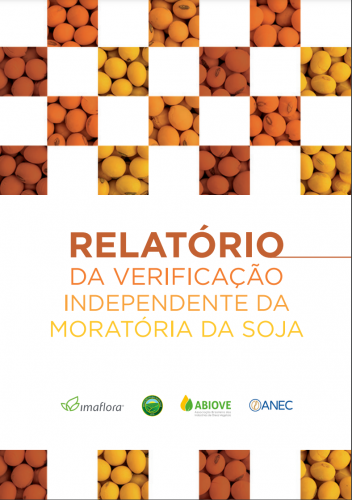15 years of Soy Moratorium: compliance and progress
The Soy Moratorium will reach its 15th year anniversary in 2021 and one of the ways to understand the current status of the commitment is through the Independent Verification Report of the Soy Moratorium, developed by the Soy Working Group (SWG) assessment committee composed of company and civil society representatives. The group’s aim is to review annual audit reports to assess company performance under the agreement.
The Institute for Forest and Agriculture Management and Certification (Imaflora) uploads the assessment of the audit reports to the transparency area of the Soy on Track platform (https://www.sojanalinha.org/transparencia). Anyone interested and the public in general can access it to monitor the adherence of companies to the commitment and their level of compliance with the criteria. The data was based on the audit of the 2019/2020 harvest.
The Soy on Track platform is a hub that offers access to systems, tools, data and technical information for a deforestation-free soybean chain. Therefore, soy processors of all sizes, traders and investors, can use this environment to find the material they need to improve and implement their commitments and policies. Producers, in turn, who are key to the implementation of these commitments, and the general public, can use it as a source of data and resources to monitor the progress of the sector’s agreements.
The Soy Moratorium is an agreement signed in 2006 with the main organisations of the sector - the Brazilian Vegetable Oil Industry Association (Abiove) and the National Grain Exporters’ Association (Anec), civil society organisations, the Environmental Ministry and Banco do Brasil - and it was created to ensure that signatory companies do not buy soybeans sourced from deforestation areas in the Amazon after July 2008.
"After 15 years of the Moratorium, we can say that implementation in general has been satisfactory with 95% of the companies not purchasing soy from areas of recent deforestation and conducting annual audits; however, there is still room for improvement", stated Isabel Garcia Drigo, Imaflora's Climate and Agricultural Chains Manager and member of the Soy on Track program. "Progress needs to be made in terms of technology and company management systems need to be adapted because these systems act as a funnel to pinpoint noncompliant suppliers,” she added.
Nineteen of the 20 companies that submitted an audit report were in compliance with the criterion of not acquiring areas deforested after July 2008. In other words, the first criterion was met by 95% of the reporting companies. After the Committee's assessment, however, it was concluded that two companies did not comply with their commitment to the Soy Moratorium and that it is not possible to define the compliance of the other companies with the agreement since not all procedures to ensure a full assessment of compliance with the Soy Moratorium were carried out.
For example, 11 of the reports had records of purchases with caveats from suppliers on the Soy Moratorium list. But the evidence shown did not include the name of the farm that sourced the soybeans, its geographical coordinate, and the Rural Environmental Registry (CAR), information that is required in the audit report and which would enable
the buyer to check if the purchase was non-compliant. After meetings with the companies, only two submitted all the necessary clarifications and evidence needed to confirm the compliance of the purchases.
Indirect suppliers
In regard to the criteria that aims to prevent soy triangulation, the reports of 13 companies included 168 purchases with caveats (an 88% increase compared to 2019), involving 36 producers that had properties that did not comply with the Soy Moratorium criteria (30% less than the number of producers involved in 2019). More than 100,000 tons of soy were purchased under the category of purchases with caveats. Only three companies accounted for 66% of the total volume of purchases with caveats and only five suppliers accounted for 64% of these purchases.
Traders must be made aware of situations in which the supplier farm sells a total amount of soybean that is higher than the average yield in the Amazon, indicating a risk of soybean triangulation (up to 3.5 t/ha is considered an acceptable amount, considering that the Brazilian average is 3.2 t/ha). The highest volume ratios per area (t/ha) reached up to 5.35 t/ha. Contrary to the terms of the Audit Protocol, 60% of the records of purchases with caveats did not include geographic coordinates, CAR and production area so the committee could not perform the analysis.
Another aspect, also related to triangulation, has to do with indirect purchases. A total of eight companies had an incomplete or incorrect contract clause referring to the Soy Moratorium requirements, another mandatory requirement according to the SWG. "In addition to compliance with the criteria, it is important for companies to be aware of the quality of the information and the risks involved in possible non-compliance," stated Drigo. In the last section, the report lists a series of suggestions for improvement to be implemented in the next cycles.
The full report is available on the Soy on Track platform.

Commitment to transparency
96% of the companies were in compliance with the soy moratorium in 2018/2019
Remote audit in times of pandemic
Challenges, lessons and the use of tested benchmarks sign off the design of the remote verification process of the companies that have adhered to the soy moratorium
Monitoring slave labour is still a challenge in the country's value chains
The inclusion of social issues would be a great step forward in the monitoring of production chains in the country.





